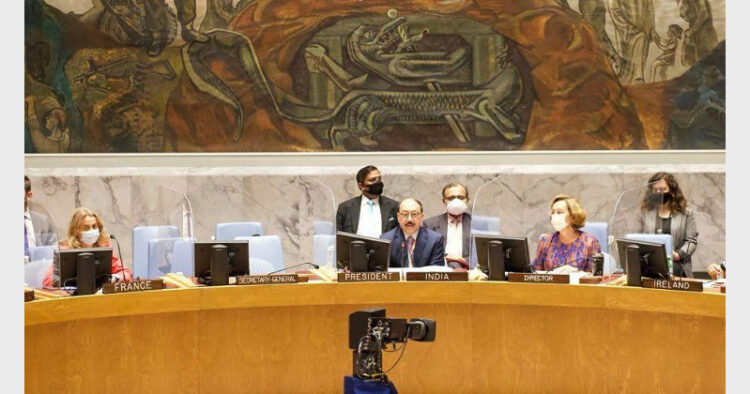New Delhi: One cannot satisfy everybody every time, which could be a well-established dictum in diplomacy. Russia says its concerns raised vis-à-vis UNSC Resolution on Afghanistan "were not reflected in the text". China, too, had its issues.
According to reports, these two permanent members, China and Russia, "broke silence" on August 29 after the draft prepared by the US, the UK and France was circulated.
The initial text reportedly focused "too closely on the Taliban". It seems that these concerns were addressed by removing language that expressed the Council's intent to monitor the Taliban's actions, particularly their respect for human rights, says a report giving inside developments.
An operative paragraph regarding humanitarian assistance originally demanded that the Taliban allow unhindered access. However, the reference to the Taliban was removed from the draft, which instead calls on "all parties" to do so. "Text which specifically demanded that neither the Taliban nor any other Afghan group support terrorists was not retained and was replaced with language which notes the Taliban's relevant commitments."
But with this resolution, India had played a crucial role. This was adopted with India at the chair, and Foreign Secretary Harsh V Shringla represented New Delhi.
"The UNSC Resolution 2593 addresses India's key concerns pertaining to Afghanistan at this time. Therefore, we played an active role in ensuring its passage," a source said.
It is also significant that the Resolution has declared that the Security Council decides to remain "seized" of the matters pertaining to Afghanistan. This was a futuristic remark, but it generates some hope that the UNSC could act tougher in the future.
Two other areas – India can draw some elements of satisfaction were in reference to the UNSC Resolution 1267, of course regarding Pakistan-based terror organisations Lashkar-e-Taiba and Jaish-e-Mohammed. Importantly, yet again, from India's perspective, the resolution also addresses India's immediate concerns about facilitating travel from Afghanistan, including Kabul Airport.
"This will cover Indian nationals stranded in the country as well as Afghan nationals including minorities Sikhs and Hindus who wish to travel to India," a source in the know of things explained. Even formally, Foreign Secretary Harsh V Shringla said the UNSC resolution has indicated a need for "safe passage" of people and to take necessary steps in its engagement with Afghanistan.
Sources said India has been in continuous touch with key members of the UNSC for an effective resolution. This issue was the subject of External Affairs Minister Dr S Jaishankar's telephone conversation with US Secretary of State Antony Blinken and high-level official contacts with other members.
Both Russia and China abstained from voting.
"During the talks, we stressed the inadmissibility of negative impacts of the evacuation of highly qualified Afghan personnel on Afghanistan's socio-economic development," said Russian Permanent Representative at UN, Vassily Nebenzia. But these elements "which are important for the Afghan people were not reflected in the text," he lamented.
The Russian diplomat also said, "….we see attempts to shift responsibility for the failure of the United States' and its allies' 20-year presence in Afghanistan onto the Taliban movement and countries of the region, which will have to face consequences of this long campaign."
He stressed Russia would continue to support Afghanistan. "On its part, Russia wants to see peaceful, secure and stable Afghanistan, with no terrorist and drug threats coming from its territory. We will continue to help Afghans attain this goal," he said, according to Tass.
US Permanent Representative to the UN Linda Thomas-Greenfield told journalists – "We were disappointed by abstentions of Russia and China."
China blamed the disorderly withdrawal of troops for the chaos in Afghanistan.
"Recent chaos in Afghanistan is directly related to the disorderly withdrawal of foreign troops. We hope that relevant countries would realise that withdrawal is not the end of responsibility but the beginning of reflection and correction," said the Chinese representative.
On August 30, at the foreign ministry briefing in Beijing, spokesperson Wang Wenbin said: "I have also noticed that the Afghan Taliban have reportedly refused the proposal of setting up a "safe zone". China believes that the international community should respect the sovereignty, independence and territorial integrity of Afghanistan and the will of the Afghan people."
The French president Emmanuel Macron pushed the 'safe zone' line around Kabul airport, but some accused him of not communicating with others very clearly.





![A Representative image [ANI Photo]](https://organiser.org/wp-content/uploads/2025/12/representative-image-e1765612818961-120x70.webp)







Comments